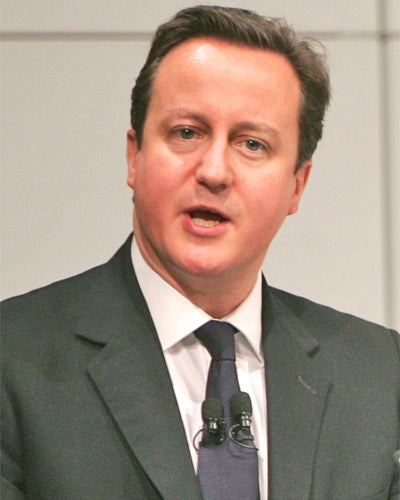Your support helps us to tell the story
From reproductive rights to climate change to Big Tech, The Independent is on the ground when the story is developing. Whether it's investigating the financials of Elon Musk's pro-Trump PAC or producing our latest documentary, 'The A Word', which shines a light on the American women fighting for reproductive rights, we know how important it is to parse out the facts from the messaging.
At such a critical moment in US history, we need reporters on the ground. Your donation allows us to keep sending journalists to speak to both sides of the story.
The Independent is trusted by Americans across the entire political spectrum. And unlike many other quality news outlets, we choose not to lock Americans out of our reporting and analysis with paywalls. We believe quality journalism should be available to everyone, paid for by those who can afford it.
Your support makes all the difference.David Cameron was tonight facing demands for a recall of Parliament amid claims Britain was now pursuing an overt policy of "regime change" in Libya.
Senior Conservative and Labour MPs said the Government had gone beyond the mandate given in last month's Commons vote to protect civilians.
The calls followed the publication of a joint newspaper article by Mr Cameron, Barack Obama and Nicolas Sarkozy saying that it would be an "unconscionable betrayal" if dictator Muammar Gaddafi was allowed to remain in power.
Three Tory backbenchers and two Labour said that MPs - currently on their Easter break - should now return to Westminster in order to have their say on the latest developments.
Conservative John Baron and Labour's Jeremy Corbyn said they had written to Commons Speaker John Bercow to formally request a recall.
Under Commons standing orders, the Speaker can order a recall at the request of a government minister. Before the House rose last week, the Leader of the Commons Sir George Young said they would do so "if circumstances require it".
However Downing Street sources played down the prospects, insisting that the Government's position had not changed as a result of the newspaper article.
But with Parliament not due to return until April 26, some MPs argued that was too long to wait.
"I feel that mission in Libya has changed quite significantly," said Mr Baron, who was the only Conservative MP to vote against military action.
"When it was put before the House, the emphasis was very much on humanitarian assistance. This has changed into a mission of regime change.
"If one was being charitable one would say that this is mission creep. If one was being uncharitable, one would say this was always the underlying motive."
David Davis, former shadow home secretary and former Tory leadership challenger, said that while he supported the Government's actions they went beyond the imposition of a no-fly zone approved by Parliament.
"The simple truth is that Parliament did not authorise the next phase," he told the BBC.
"While I approve of the next phase - I think it is necessary, I think it is probably unavoidable, and I think that Cameron has done the right thing at every step so far - to go to the next phase he has to get parliamentary authority."
Fellow Conservative Peter Bone said ministers should honour their commitment to give MPs a chance to discuss the situation if the position on Libya changed.
"I think we should recall Parliament so that Parliament has its say about what the Government is saying. That is what we were promised in many speeches before we broke up," he said.
Mr Corbyn, a veteran Labour leftwinger, said Mr Cameron's article confirmed that the Government was now pursuing a policy of regime change.
"I think it is a matter of such importance that Parliament should be recalled to debate the matter," he said.
"Britain and Nato are making a habit of wars with questionable legality or justification. The West seems to have no interest in a political solution and is prepared for a military campaign which now clearly focuses on regime change."
Senior Labour backbencher David Winnick said that it would be "appropriate" for Parliament to be recalled early next week.
"I think there's growing unease over precisely what the situation is - but particularly how long it's going to last, the stalemate, and where it's leading. It's now very near regime change," he said.
"However much we despise the murderous Gaddafi clan, and that includes his sons as well as the father, the fact remains that it's not currently possible under international law for regime change to take place."
Meanwhile Foreign Secretary William Hague insisted Britain's Nato allies remained "very much on the same page" after alliance foreign ministers meeting in Berlin failed to agree on a call by the UK and France to send for more ground attack aircraft to step up air strikes on Gaddafi's forces.
He said discussions would continue, adding: "Given that it is such a broad range of nations, actually the extent of the unity and resolve and the agreement on our objectives is remarkable."
Dutch foreign minister Uri Rosenthal - whose country's aircraft are helping to enforce the international no-fly zone - said he did not believe that existing United Nations resolutions authorised air strikes.
"This question actually goes beyond Security Council Resolution 1973," he said. "For the Dutch government, it is of the utmost importance to fully respect the framework of the resolution."

Join our commenting forum
Join thought-provoking conversations, follow other Independent readers and see their replies
Comments